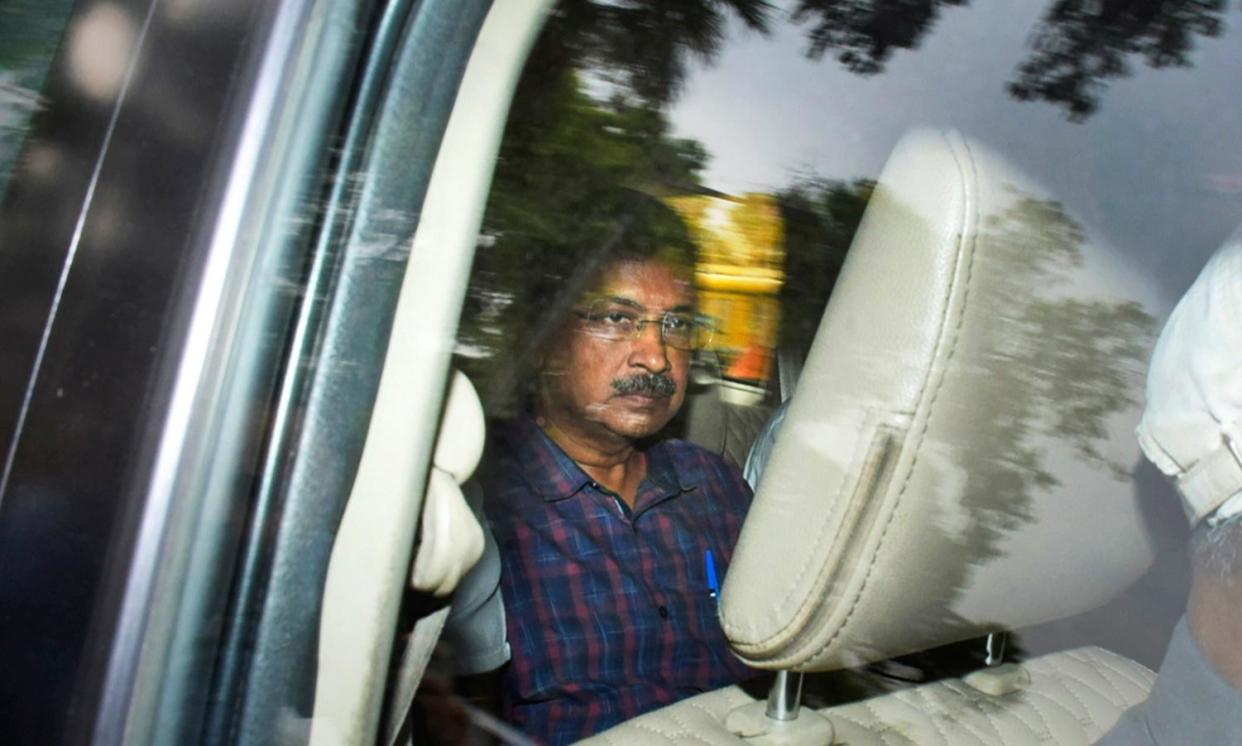Arvind Kejriwal: the Delhi chief minister jailed by Modi’s government

When Arvind Kejriwal emerged on to India’s political scene in 2011, he was an outsider with over a decade of activism behind him. Today he is one of the country’s most recognised opposition leaders and his political party governs two powerful states.
Yet Kejriwal’s swift rise from newcomer to political heavyweight, standing up against the might of the Narendra Modi government, has appeared to come at a cost. Last week, Kejriwal, who is the longstanding face of India’s anti-corruption movement, was detained on corruption charges – becoming the first sitting chief minister to be arrested. He will be held in custody for at least 10 days.
The case against him was instigated by a powerful investigation agency under the control of the Modi government. Kejriwal called it a political conspiracy to crush his party and tarnish its chances in India’s election, which begins next month. The Modi government denies any political agenda.
Kejriwal did not come from a political background. A mechanical engineer who later worked for the income tax department, he instead rose to prominence through his civilian activist movements focusing on transparency and rooting out everyday corruption. In the 1990s, he began the organisation Parivartan, which helped people access information from the government and exposed bribery scams.
After the success of several campaigns, including protests against corruption in India’s Commonwealth Games, in 2011 Kejriwal formed his own political party, called the Aam Aadmi (“common man”) party, starting out in Delhi.
Kejriwal’s drive against corruption made him a popular figure and the AAP swiftly grew to be a political force in the capital. In 2013, the AAP defied the odds to wrest power from the established parties and win the state assembly elections.
Kejriwal did not last long as chief minister, resigning just two months later when his party failed to pass a pivotal transparency bill that he had run his campaign on. It proved politically savvy in the long run, boosting his popularity for being seen to stand by his anticorruption principles.
In the next state assembly elections in 2015, the AAP won a resounding victory, returning Kejriwal to power and beating Modi’s Bharatiya Janata party (BJP), which had won the general election the year before. It was the beginning of a rivalry between the two parties, which escalated after the AAP beat the BJP again in the 2020 state elections.
Kejriwal’s government was praised for improving Delhi’s schools and healthcare as well as welfare schemes giving away free electricity, but faced criticism for being seen to pander to Hindu nationalist politics and for failing to tackle Delhi’s pollution, which remains the worst in the world. Many of the AAP’s early champions have left the party, disillusioned by its governance.
Nonetheless, in 2022 the AAP won the state elections in Punjab, a big step in establishing it as a political force beyond the capital.
Since coming to power in Delhi, Kejriwal has repeatedly accused the Modi government of trying to undermine and sabotage the actions of his state government.
The AAP government’s attempts to overhaul Delhi’s complex and archaic alcohol licensing laws, and open up the market to private vendors, ran Kejriwal afoul of India’s enforcement directorate, a central government agency tasked with investigating large-scale financial fraud.
Not long after the AAP returned to power, the directorate began to investigate the party, alleging it was using the new alcohol licensing laws to favour certain so-called liquor barons for lucrative deals in exchange for billions of rupees in kickbacks.
Party officials deny any corruption but several senior figures were rounded up and detained, including Kejriwal’s close ally and deputy chief minister, Manish Sisodia, who has been in jail for over a year.
This year, the directorate summoned Kejriwal for questioning in the case. He refused to comply, accusing the agency of being weaponised by the BJP to go after political opponents. Finally, after more than a dozen ignored notices, last week the directorate sent police officers to Kejriwal’s house with a warrant, arresting him that night. The courts have since allowed them to keep him in custody till at least 1 April.
There has been a loud chorus from the BJP calling for Kejriwal to resign. Many believe efforts will be made to keep him in jail for as long as possible. His party has said he will not bow to pressure and Kejriwal has vowed to continue governing the capital from prison and fight the general election.
“If the BJP thinks that they can finish the Aam Aadmi party and threaten the entire opposition by arresting Arvind Kejriwal, then they are wrong,” said Gopal Rai, a Delhi government minister, after the arrest. “Arvind Kejriwal is not a person, he is an ideology.”

 Yahoo News
Yahoo News 
